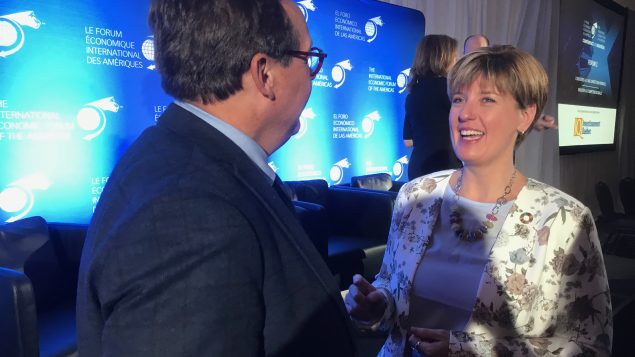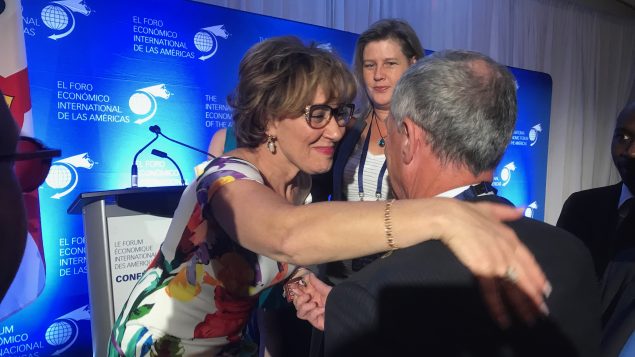International Development Minister Marie-Claude Bibeau named Tuesday a well-known Quebec entrepreneur and media personality Daniele Henkel as Canada’s representative to a World Bank group that works to promote women entrepreneurship in developing countries.
The Morocco-born self-made millionaire and the former “dragon” on a popular Quebec TV reality show Dans l’œil du dragon has been named a leadership champion of the Women’s Enterprise Leadership Group to assist the Women Entrepreneurs Finance Initiative (We-Fi) in supporting women entrepreneurs in developing countries, Bibeau announced.
“I congratulate Danièle Henkel on her appointment as a champion of women’s economic empowerment in developing countries,” Bibeau said.
“We know that we all benefit when women fully participate in our economies. Advancing gender equality and empowering women to lead and manage their own businesses will help raise their families and communities out of poverty.”
$1.6 billion raised for women entrepreneurs
We-Fi was launched at the G20 Summit in Hamburg, Germany, in July 2017 with the financial backing of 14 governments, including that of Canada, Bibeau told Radio Canada International in an interview on the sidelines of the 25th edition of the Montreal Conference international forum.
“Canada was one of the first countries to contribute to this We-Fi initiative with a $20 million investment,” Bibeau said. “And with 14 governments we put $340 million in this initiative and the objective was to raise $1 billion in private investment. And only with the first call for proposal we are already at $1.6 billion.”
(click to listen to the interview with Marie-Claude Bibeau)
ListenThe fund will provide financial support, training and networks to women who own and operate small and medium-sized enterprises (SME) in developing countries, Bibeau said.
According to World Bank, women entrepreneurs face numerous challenges to financing, owning, and growing a business, including legal and policy obstacles to business ownership and development.
About 70 percent of women-owned SMEs in developing countries can’t get the capital they need, resulting in a credit deficit of nearly $1.5 trillion, according to World Bank estimates.
Breaking barriers

Minister of International Development and La Francophonie Marie-Claude Bibeau was one of the guest of honour at the 25th edition of the Montreal Conference international business forum. (Levon Sevunts/RCI)
With the We-Fi fund and various initiatives within its Feminist International Assistance Policy Canada is working on overcoming barriers for women entrepreneurs, Bibeau said.
“We know that it’s harder for women to have access to the markets, to have access to financing, in many countries it’s the laws that are discriminating them from having the right to own property or having the right to own a business,” Bibeau said. “So the idea is to work on these barriers, to work with local women’s organizations, to work with local government as well for them to have more inclusive laws and programs.”
Educating girls
This idea of breaking barriers for girls and women also underpinned the initiative to raise billions of dollars for a fund to educate girls in conflict situations championed by Canada at the recent G7 leaders’ summit in Charlevoix, Bibeau said.
The announcement that Canada was able to raise $3.8 billion dollars in pledges towards education of girls in developing countries and conflict situations was one of the biggest achievements of the tumultuous summit that was overshadowed by dramatic disagreements over trade.
“We all agree that if we want to empower women, we need educated girls and have to work once again on the barriers that adolescent girls have to face to complete their education and to access a career or to build a business,” Bibeau said.
The idea is to provide girls with school and qualified teachers, but also to look at environmental factors that prevent adolescent girls from going to school and completing their education, she said.
“It could be because of violence, because of rape, because of early marriage, because of early pregnancy, because it’s not secure to get to school, because there are no sanitary (conditions) for girls, especially when they have their menstruation, they don’t go to school,” Bibeau said. “There are so many barriers.”
Changing cultural and social norms
Development and humanitarian groups welcomed the government’s announcements.
“It is encouraging that Canada is taking a leadership position in the global efforts to empower women and girls in crisis, and to create new opportunities for women entrepreneurs in developing countries,” said Julia Sanchez, president and CEO of the Canadian Council for International Co-operation (CCIC), an umbrella group that brings together Canadian-based international development and humanitarian organizations.
“To be truly transformative and feminist, Canada also needs to address the social and political barriers that impede women from being fully empowered, such as changing cultural and social norms and stereotypes, updating legislation and policy so that it does not discriminate based on gender, and advocating for greater space for women in positions of economic and political leadership.”







For reasons beyond our control, and for an undetermined period of time, our comment section is now closed. However, our social networks remain open to your contributions.